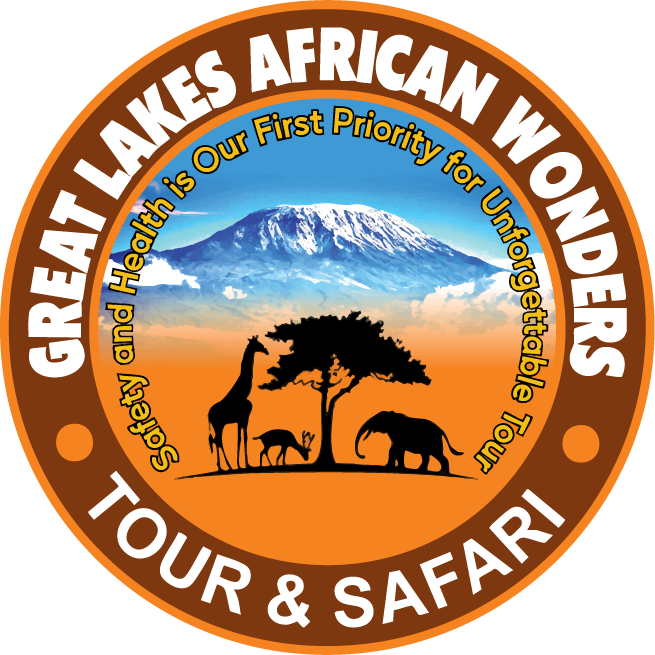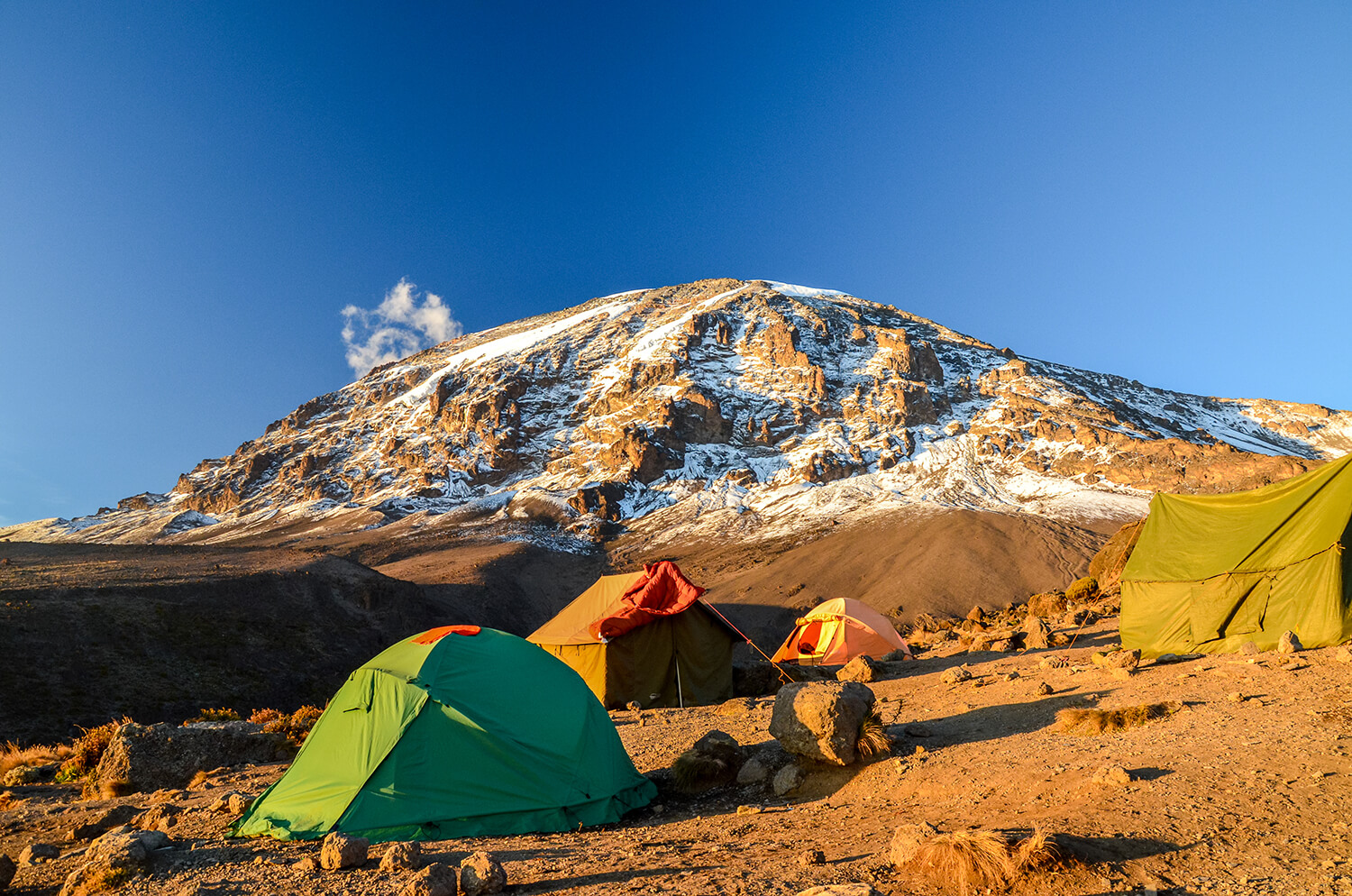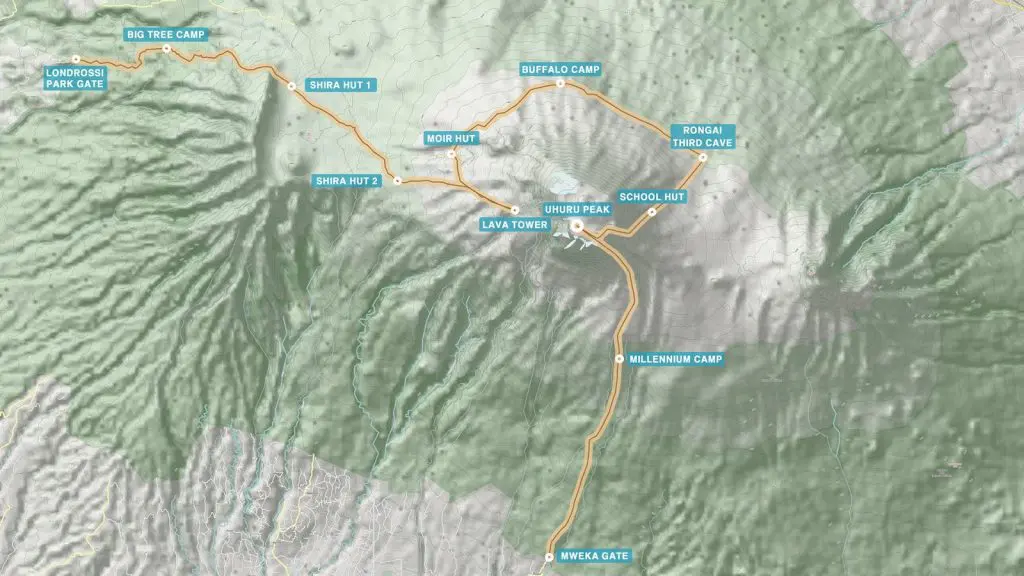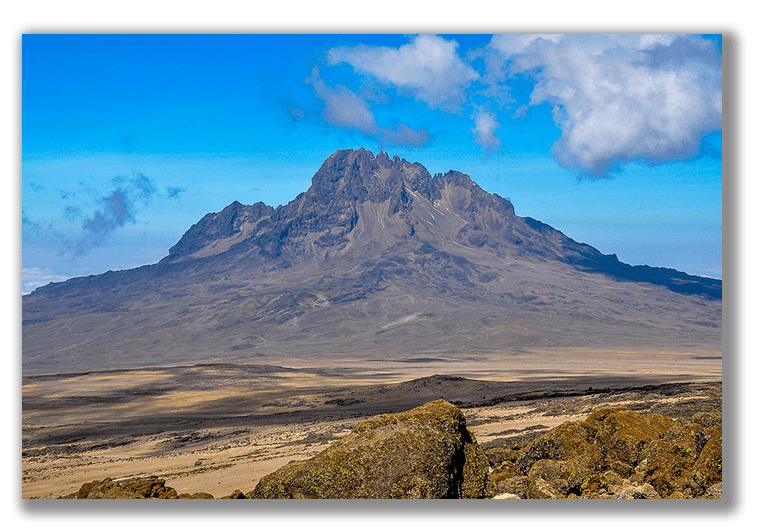The Northern Circuit Route is Kilimanjaro’s longest and most remote trail, offering trekkers unmatched panoramic views, excellent acclimatization, and minimal crowds. Starting via the Lemosho Route, the trail loops around the mountain’s rarely-seen northern slopes, before summiting via the Rongai route path.
This route is ideal for those with the time to spare and looking for the best chance of summiting, thanks to its longer acclimatization period and steady elevation gain. It’s a true wilderness adventure on the roof of Africa.
Trek Time: 3–4 hours
Distance: ~7 km
Habitat: Montane forest
After registration, drive to Lemosho Gate and begin the trek through a lush rainforest. Possible sightings of monkeys and forest birds. Overnight at Mti Mkubwa Camp (“Big Tree” Camp).
Trek Time: 5–6 hours
Distance: ~8 km
Habitat: Moorland
A steady climb leads to the Shira Plateau with views of Kibo Peak. You’ll camp at Shira 1, offering expansive mountain views.
Trek Time: 3–4 hours
Distance: ~7 km
Habitat: Moorland
Trek across the high-altitude plateau with views of glaciers and volcanic formations. Acclimatization begins here as you spend a second night on the Shira Plateau.
Trek Time: 6–7 hours
Distance: ~14 km
Habitat: Alpine desert
Ascend to Lava Tower for acclimatization (4,630m), then descend to Moir Hut, a remote camp with minimal traffic and beautiful surroundings.
- Trek Time: 5–6 hours
- Distance: ~9 km
- Habitat: Alpine desert
Climb out of the Moir Valley, then circle around Kilimanjaro’s northern slopes. The trail is peaceful and offers views across the Kenyan plains.
Trek Time: 5–6 hours
Distance: ~8 km
Habitat: Moorland
Continue traversing the remote northern face of Kilimanjaro. You’ll camp at Third Cave, another quiet, scenic site far from the busier southern trails.
Trek Time: 4–5 hours
Distance: ~5 km
Habitat: Alpine desert
Ascend gradually to School Hut, your base camp for the summit attempt. Early dinner and rest as the summit push starts just before midnight.
Summit Time: 6–8 hours to the top
Descent Time: 6–8 hours
Distance: ~6 km up / ~12 km down
Habitat: Arctic at summit, moorland on descent
Begin summit at midnight via Gilman’s Point (5,685m) and onward to Uhuru Peak. Celebrate, then descend back to Mweka Camp for your final night on the mountain.
Trek Time: 3–4 hours
Distance: ~10 km
Habitat: Rainforest
Descend through lush forest to Mweka Gate. Receive your summit certificate and transfer to your hotel in Moshi or Arusha.
Included in the Package
- Summit Certificate
- Pre-climb briefing
- Safety Equipment
- Pre-climb briefing
- Safety Equipment
- All Meals on the Mountain
- Safety Equipment
Not Included in the Package
- International flights
- Tanzanian visa fees
- Accommodation before and after the trek (available on request)
- Personal hiking gear (can be rented in Tanzania)
- Travel & medical insurance (mandatory)
- Tips for guides, porters, and cook (recommended guideline provided)
- Items of a personal nature
- Laundry, snacks, beverages at the hotel
- Portable toilet (optional upgrade)
The Northern Circuit offers the highest summit success rate (90%+), the most scenic views, and is the least crowded route on Mount Kilimanjaro. It circles the mountain from the west to the north, giving climbers a unique 360-degree experience with excellent acclimatization.
The recommended Northern Circuit itinerary takes 9 days on the mountain, with additional days for arrival and departure. This allows your body to adjust to altitude and increases your summit success rate.
You don’t need to be an athlete, but you should have good physical fitness and be comfortable with multi-day hiking. It helps to train with cardio, hiking, and hill walking at least 1–2 months before the trip.
The route starts low and climbs gradually, reaching Uhuru Peak (5,895m) on day 8. The longer duration allows your body to adapt to high altitude slowly and safely.
Yes, but the Northern Circuit is designed to minimize altitude sickness due to its gradual ascent. Daily health checks and optional Diamox (altitude medication) can also help.
- All park fees
- Tents and camping gear
- Professional guides, porters, and cook
- All meals and drinking water on the mountain
- Transfers to/from the mountain
- Daily health monitoring and first aid
(Full list available in the “Included” section.)
You’ll be served fresh, energy-rich meals 3 times a day, including fruits, vegetables, carbohydrates, and proteins. Dietary restrictions (vegetarian, gluten-free, etc.) can be accommodated with advance notice.
At the summit, temperatures can drop to -10°C to -20°C (14°F to -4°F). Proper cold-weather clothing and a warm sleeping bag (rated to at least -10°C) are essential.




